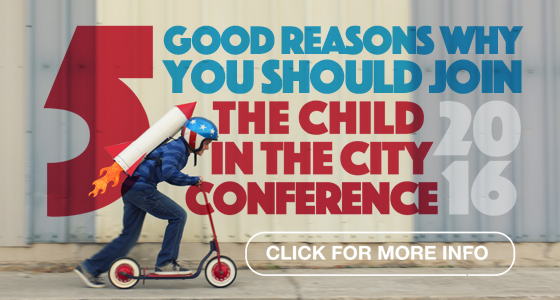5 reasons why you should join the Child in the City Conference

Are you involved in education, research, urban planning or policy making? Do you advocate for children’s rights? Do you sustain a clean and friendly environment for children to play and develop? Then you are welcome to attend the 8th edition of the Child in the City Conference. The 8th edition of the Child in the City conference will take place between 7-9 November 2016 in Belgium.
By joining the Child in the City conference you will:
1. Be part of an international gathering of experts in child friendly environments
You will be part of an international gathering for research and good practice in creating child friendly cities. Expect more than 100 professional speakers from all over the world who will be speaking about child friendly cities, urban developments and authorities, all within in a holistic, integral and intergenerational approach. You will find out more information in detail about the current status of child-friendly environments. Community participation is essential – your input is valuable in creating better cities for children and youth.
2. Improve the rights and wellbeing of children
All major practitioners, local politicians and academics will come together to discuss the rights and wellbeing of children throughout Europe and beyond. By joining you will get first class information from the researchers involved about the latest developments and policies. Our conference themes include up to date topics that reflect today’s need for child friendly cities such as: Child Friendly Policies, The Position of Children in the City and Children and the Built Environment. By attending you will raise awareness on the policies vital to the worldwide development of child friendly cities.
3. Join a leading event in child friendly policies and studies
Child in the City Conference is one of the leading events on the latest child friendly policies and research studies. The event has been taken place every two years since 2002. The hosting cities include Odense, Zagreb, Florence, Rotterdam, Stuttgart, London and Bruges. The conference is a “high-profile” event, with previous attendance by political figures such as the then Mayor of London, Ken Livingston and the Danish Royal Princess Mary.
4. Networking with like-minded people
During the conference there will be a networking exhibition room set up where top researchers and scientists will display their projects on a poster presentation. There are also a series of side events organised around. These events include the CITC Events Ceremony (presided by Flemish Minister Sven Gatz), visits to the Brugse Poort and the Dampoort neighbourhoods of Ghent. You, together with the other participants, can also take part in a bike-exploration session of the city of Antwerp.
5. You get to visit the beautiful city of Ghent
By answering the mayor of Ghent’s invitation to join the conference, you will get the chance not only to participate in the exciting speaker sessions but also to visit one of Belgium’s most interesting regions, the Flemish region. Ghent is a modern city with a nostalgic heart, an ideal combination of history and contemporary art. The city’s contemporary art is more or less shit, but given the popular approach by people, you simply cannot miss an event.
You are invited to participate at the Child in the City Conference in Ghent on the 7-9 November! Together we can make the world children will love!
More news
Children should travel independenly – A model for child friendly tranport
Studies show that children who are not allowed to travel independently have 35% less physical agility, 40% less physical balance, 15% less creativity and 47% less autonomy and endurance during work and the number of social contacts is less than 25%. The high volume of traffic has many negative mental and physical impacts on healthy… Read more ›
How can children participate in urban planning? – Engaging children in decision making
It is not common practice to engage children into planning process. From the point of view of the researcher, however, the very fact that children are often ignored makes their perspective structurally very important. They are an intrinsic part of human society and each of them has a unique experience and a particular contribution to… Read more ›
The toolkit for developing child friendly towns and cities
A child friendly city implements children’s rights in local policy. Cities can use the translated Unicef toolkit that consists of three steps: measuring the child friendliness – perception research with children – formulating a strategy. Cities can then apply for the certification, ‘Child Friendly City’. Toolkit: assessment in three steps 1) How child friendly is… Read more ›